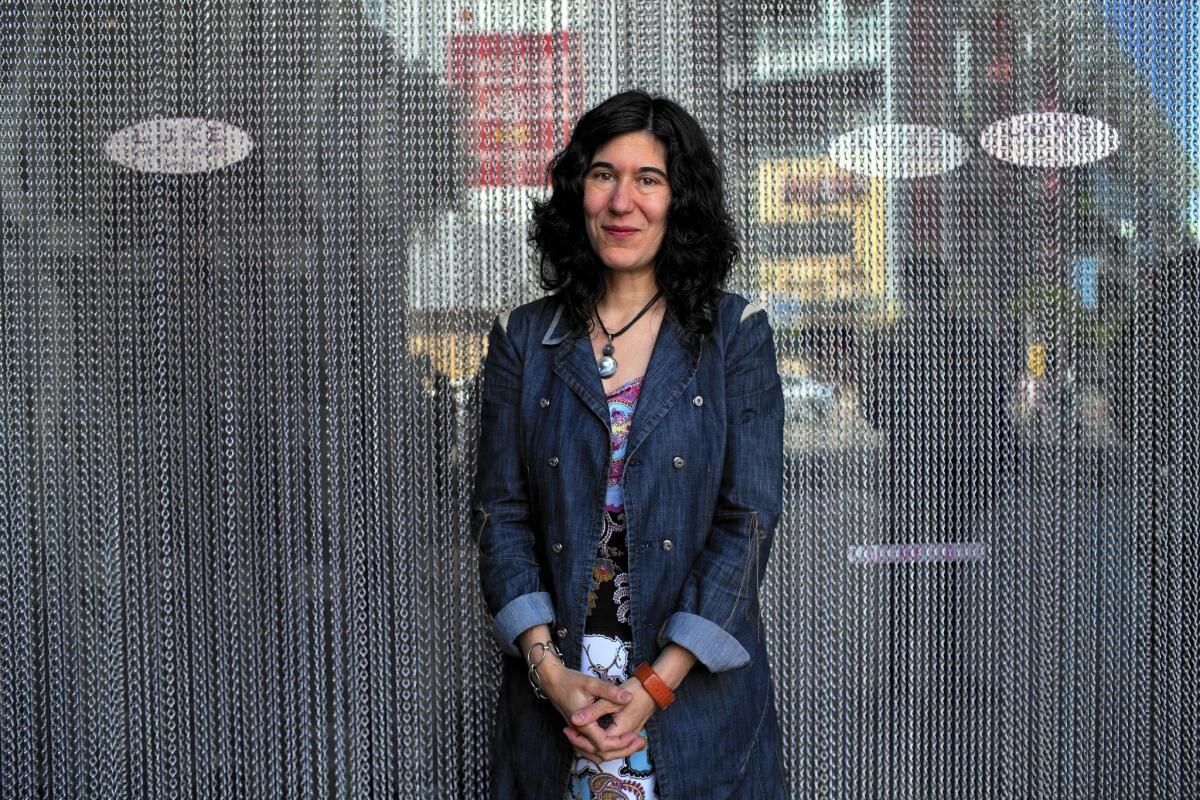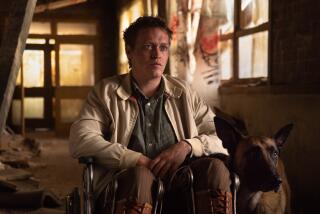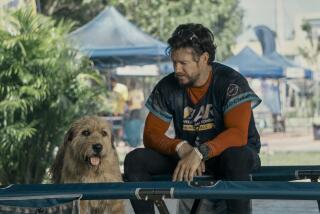Debra Granik tells a Vietnam veteran’s tale in ‘Stray Dog’ documentary

Since Jennifer Lawrence’s breakout performance in 2010’s “Winter’s Bone,” she’s won an Oscar, launched a young adult blockbuster franchise and become the face of Dior.
Since Debra Granik directed “Winter’s Bone,” she’s been camped out at a Southern Missouri trailer park with a burly, Harley-riding Vietnam vet.
For the better part of three years, the 51-year-old filmmaker has shuttled between her New York City home and Reeds Spring, Mo. (population: 913), to make a documentary called “Stray Dog.” The movie, which premiered at the Los Angeles Film Festival last weekend, had Granik returning to the poverty-ridden Ozarks — also the backdrop for “Winter’s Bone.” This time, she trained her lens on Ron Hall, a husky 67-year-old trying to navigate both his post-traumatic stress disorder and a new romance with a Mexican immigrant.
After “Winter’s Bone” earned four Academy Award nominations in 2011, including one for best picture, many in Hollywood cheered the arrival of an important new woman filmmaker. But the pressure of living up to those expectations — attaching herself to a big screenplay, working with top names — worried Granik.
“The questions that loom can be intimidating,” says Granik, who speaks with an urgency that demands your attention. “ ‘What kind of moves is she gonna make? What is she gonna do?’ There is this pressure that you’re supposed to keep impressing.”
She explored making another narrative film — this one with an urban setting — and traveled numerous times to Baltimore to shoot preliminary footage. Unable to settle on the proper end for that movie, however, her mind drifted back to Hall. She’d first met him in a biker church while scouting locals for “Winter’s Bone” and thought he’d be perfect to play intimidating crime boss Thump Milton. During the service, she found herself transfixed by his hairy arms and the American flag tattooed on his biceps. So she ran after him, she says, like a “nerdy Eastern lady,” and soon he’d landed the part.
The role called for someone tough-looking — salty, bearded, leather-clad. But as Granik spent time with Hall off set, she began to see a different side to him. On one visit to At Ease RV Park, which Hall has been running for about a decade, she was surprised to find him in his trailer with four small dogs nuzzled against his gut.
“He had worked out this symbiotic system where the dogs provided almost this bodily, therapeutic thing,” she recalls. “They were like barnacles on him. The emotions that he couldn’t handle sort of cycled through the dogs. It was the most primal and intimate animal-human relationship I had ever witnessed.”
It was then that Granik knew Hall was a worthy subject — one whose humor and lack of self-consciousness had the potential to make the plight of Vietnam vets accessible. But she also wanted to return home to her life in New York with her husband and her daughter, now 9.
“I was like, ‘Oh, God, I need my coffee and to be all small and coastal and weird and middle class and liberal,’” she said. “But my affection for him took over, and it was kind of like an endorphin.”
As it turned out, the director and her subject’s paths had crossed at a pivotal point in his life: Hall had recently returned from a trip to Mexico, where he fell in love with a woman 23 years his junior named Alicia. The couple soon moved into Hall’s trailer together and began trying to bridge their cultural differences. Hall bought a computer program to teach him Spanish; Alicia learned to love microwaved ham with gravy. He helped her 19-year-old twin sons emigrate from Mexico; she comforted him when he awoke from PTSD-triggered nightmares.
In many ways, Hall turned out to be the ideal subject for Granik. He allowed her to trail him on his annual biker pilgrimage to the Vietnam Veterans Memorial in Washington, D.C., where he broke down in tears. He let her sit in on his therapy sessions. And when it came to his body, he was uninhibited — he let Granik film him lying in bed with Alicia, and readily revealed how few pairs of underwear he took on road trips.
“I know the hillbilly lifestyle interests people on the East Coast. But Debra don’t judge me,” Hall says by telephone from his home this week. “I never get embarrassed. The only time I told her she might want to get out was when Alicia and I were going to bed and I said she might want to leave unless she wanted this to turn into a porn.”
Hall did not travel to Los Angeles this week out of fear that the crowds might trigger his PTSD, Granik says. But he’s also wary of being the center of attention. Few people ask him about his experience on “Winter’s Bone,” save for some guy he ran into in Costa Rica who said he “was the luckiest guy in the world because [he] got to touch Jennifer Lawrence’s face.”
Granik, too, eschews the spotlight and appears uninterested in the glamorous trappings of Hollywood. She doesn’t wear makeup, is allowing her hair to go gray and wears the same favorite jacket to this interview that she did to one in 2010. Thinking about the kind of fame Lawrence has achieved, she says, is kind of unfathomable.
“I could not handle it. Whatever my neurochemistry is, I would buckle under,” says Granik, who acknowledges she and the actress have not kept in close contact. “I feel excited about Jennifer’s trajectory, though, because she’s really becoming somebody who is articulate and vocal about navigating issues that women in the performance industry face. ‘Can I be who I am? When I feel healthy, is that good enough?’ She’s putting that out there with her humor and sassy, intelligent style.”
While Granik may not be clamoring for the kind of attention Lawrence receives, she is still hungry for her work — and for “Stray Dog” — to get some recognition.
“I’m not outside of that,” she says. “It’s a state of grace I wish I had more of, like musicians who have no greater gain than to play a picking session. But I’m not monastic. What I would love is for people to see some of the stories I want to tell.”
Hall may be looking for a version of the same thing.
“I know a lot of veterans across this country are stuck in Podunk towns and I’m hoping this will put some exposure out there. I know I’m not something special,” he says. “I don’t want to come across like I’m trying to be some hero soldier.”
Last month, Granik traveled to Missouri to screen the movie for him, and she could tell that he felt a reluctant sense of pride in giving voice to the struggles many vets face.
“He needs to be needed,” she says. “That’s part of what gives him self-worth.”
More to Read
Only good movies
Get the Indie Focus newsletter, Mark Olsen's weekly guide to the world of cinema.
You may occasionally receive promotional content from the Los Angeles Times.







